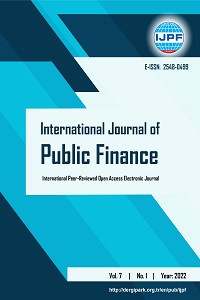The Effect of Applying E-Filling Applications towards Personal Taxpayer Compliance in Reporting Annual Tax Returning (SPT) in Bengalis State Polytechnic Indonesia
Electronic, Filling, Compliance, Taxpayer, Individual
The Effect of Applying E-Filling Applications towards Personal Taxpayer Compliance in Reporting Annual Tax Returning (SPT) in Bengalis State Polytechnic Indonesia
Electronic, Filling, Compliance, Taxpayer, Individual,
___
- Abdul Jabbar Hijattulah dan Jeff Pope, 2008, Exploring The Relationship Between Tax Compliance Costs and Compliance Issues in Malaysia, Journal of Applied Law and Policy.
- Agustiningsih, Wulandari. 2016. Pengaruh Penerapan E-Filing, Tingkat Pemahaman Perpajakan Dan Kesadaran Wajib Pajak Terhadap Kepatuhan Wajib Pajak di KPP Pratama Yogyakarta. Jurnal Nominal, Volume 5, Nomor 2, Halaman: 107-122.
- Alla, Mikel . 2014. conducted a research entitled The System of Tax filing in Albania, "E-filing". International Journal of Science and Technology, Volume 3 No. 9, September, 2014. pp. 501-507
- Azmi, Anna A.C., Kamarulzaman, Yusniza and Hamid, Nor H.A. 2012. Perceived Risk and the Adoption of Tax E-Filing. World Applied Sciences Journal, Vol. 20, No. 4, pp. 532-539.
- Bremen, A. Jason and Morgan, S. Belinda. 2004. States Adopt a Profitable ‘Carrot and Stick’ Approach to Tax Amnesty. Journal of Multistate Taxation and Incentives, Jul 2004, pp. 1-7.
- Dijen. (2014), Informasi E-Filling Melalui Penyedia Jasa Aplikasi Atau Aplication Service Provider (ASP). Diakses pada 07 Februari 2016 dari http://www.pajak.go.id
- Efferin, Sujoko. Stevanus Hadi Darmaji dan Yuliawati Tan (2004), Metode Penelitian Untuk Akuntansi, Malang : Bayumedia Publising.
- Lim, Ai Ling, Masrom, Maslin and Din, Sabariyah. 2014. The influence of e-Participation on e-Filing Participation: A Study of Citizen Adoption on e-Government Services. International Journal of Engineering Science and Innovative Technology (IJESIT), Volume 3, Issue 5, pp. 251-260.
- Luitel, S. Hary and Sobel, S. Russell. 2005. The Revenue Impact Of Repeated Tax Amnesties. Working Paper. http://www.papers.ssrn.com, di download tanggal 14 Maret 2009, pp 1-37.
- Mardiasmo, (2009). Perpajakan. Edisi Revisi, Yogyakarta : Andi Offset.
- Muljono, Djoko dan Baruni Wicaksono.(2009). Akuntansi Pajak Lanjutan. Yogyakarta: Andi Offset.
- Purwono, Herry. (2010). Dasar-Dasar Perpajakan dan Akuntansi Pajak. Yogyakarta : Erlangga.
- Rahman, Abdul. (2010), Panduan Pelaksanaa Administrasi Perpajakan. Bandung: Penerbit Nuansa.
- Republik Indonesia, Undang-Undang Nomor 28 Tahun 2007 tentang Perubahan Ketiga atas UndangUndang Nomor 6 Tahun 1983 tentang Ketentuan Umum dan Tata Cara Perpajakkan.
- Resmi, Siti. (2014). Perpajakan Teori dan Kasus. Jakarta : Salemba Empat.
- Risky, Dianita. (2015), Analisis FaktorFaktor Yang Mempengaruhi Intensitas Perilaku Dalam Penggunaan Sistem E-Filling. Jurnal Administrasi Bisnis - Perpajakan (JAB) Vol. 6 No. 1 2015
- Ritsema, Christina and Thomas, Deborah and Ferrier, Gary. 2003. Economic and behavioral Determinants of tax compliance: Evidence from the 1997 Arkansas tax penalty amnesty program. Presented at the 2003 IRS Research Conference. Working Paper, http://www.papers.ssrn.com di download tanggal 14 Maret 2009, pp 1-27
- Suandy, Erly (2011). Perencanaan Pajak, Edisi Keempat, Jakarta : Salemba Empat.
- Supramono dan Theresia Woro Damayanti. (2010). Perpajakan Indonesia Mekanisme dan Perhitungan, Yogyakarta : Andi Offset.
- Tambun, Sihar. 2016. Pengaruh Kesadaran Wajib Pajak Dan Penerapan E-System Terhadap Tingkat Kepatuhan Wajib Pajak Dengan Preferensi Resiko Sebagai Variabel Moderating. Media Akuntansi Perpajakan, Vol. 1, No. 2, Halaman: 86-94.
- Waluyo (2013), Perpajakan Indonesia, Edisi Kesebelas, Jakarta : Salemba Empat.
- Zuhdi, Firdaus Aprian. 2015. Pengaruh Penerapan E-Spt Dan Pengetahuan Perpajakan Terhadap Kepatuhan Wajib Pajak (Studi Pada Pengusaha Kena Pajak yang terdaftar di KPP Pratama Singosari). Jurnal Perpajakan (JEJAK) Vol. 7 No. 1. 2015
- Yayın Aralığı: Yılda 2 Sayı
- Başlangıç: 2016
- Yayıncı: Adnan GERÇEK
Azerbaycan Ekonomisinde Fiyat Oluşumunda Tarif Şurasının Rolü
Fiscal Decentralization in Turkey and Differentiation in Selected Provinces
Ahmet Güzel, Hakkı Hakan Yılmaz
Küresel Ekonomik Kriz Döneminde Türkiye'de Uygulanan Vergi Politikalarının Değerlendirilmesi
Çağlayan Tabar, Mircan Tokatlıoğlu
Devletin Rolüne İlişkin Tercihlerin Belirleyicileri: Ülkeler Arası Karşılaştırma ve Türkiye
Gelir ve Fonksiyonel Kamu Harcamaları İlişkisi: Bölgesel Düzeyde
